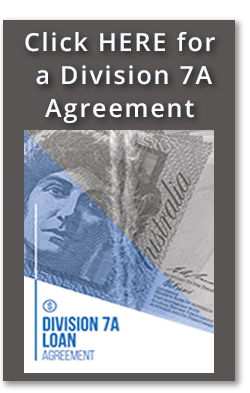As the owner of a private company, it’s normal – and completely legal – to borrow money from your business. However, thanks to Division 7A of the Tax Act, failing to properly record that loan could land you in some serious strife come tax time. Here’s how it works, and how to avoid its impact this end of financial year.
What is Division 7A?
Division 7A is an anti-avoidance measure designed to stop private companies distributing tax-free profits to shareholders or their associates. It applies to loans, advances, payments and other credits made by companies to their shareholders or associates.
Under division 7A, these payments are categorised as unfranked dividends and treated as assessable income unless they fall within specified exclusions.
Who does it apply to?
Division 7A applies to private companies, their shareholders and associates. ‘Associate’ is widely defined under the Act but for individual shareholders, can include a:
- Relative of the shareholder
- Partner of the shareholder or a partnership in which the shareholder is a partner
- Spouse or child of an individual partner
- Company controlled by the shareholder or associate
For a company shareholder, ‘associate’ includes:
- A partner of the company or partnership in which the company is a partner
- Another individual or associate controlling the company
- Another company under the control of the company or the company’s associate
When does it apply?
Division 7A is triggered when a company:
- Makes payments to a shareholder or shareholder’s associate, including transfers or use of property for less than market value
- Lends money to a shareholder or shareholder’s associate without a specific loan agreement, and the loan is not fully repaid by lodgement day of that income year
- Forgives a debt owed by a shareholder or shareholder’s associate to the company
Payments not treated as dividends include:
- Repayments of genuine debts owed to a shareholder or associate
- Payments or loans to a company (not including a company acting as a trustee)
- Payments otherwise assessable under another provision of the Tax Act
- Payments made to shareholders or associates in their capacity as employees or an employee’s associate
- Liquidators’ distributions
How can you avoid it?
Division 7A a dividends often arise when a company fails to keep private expenses separate from company expenses. To avoid triggering Division 7A:
- Don’t pay private expenses from a company account
- Keep proper records that explain all company transactions, including payments to and receipts from associated trusts and shareholders and their associates
- Create a written agreement with terms that ensure the loan is treated as a complying loan if and when the company lends money to its shareholders or associates
How do you implement a loan agreement?
The best way to avoid a Division 7A dividend is to create loan agreements before lending to associates.
To implement a loan agreement:
- Put the loan in writing before the company’s lodgement date
(Lodgement date is the date on which the company tax return is lodged, or the due date for lodgement – whichever occurs first)
As with any written agreement, a Division 7A Loan Agreement should include:
- The full names of the parties
- The terms of the loan, including:
- The loan amount
- The date the loan is drawn down
- Repayment terms and dates
- Interest payable
- The date the agreement was made
The agreement doesn’t need to be approved by the ATO, but keep in mind it does need to satisfy all the requirements of the Income Tax Assessment Act.
- Ensure the rate of interest is equal to or above the Indicator Lending Rates
– i.e. The bank variable housing loans interest rate last published by the RBA before the start of the lending entities’ income year.
- Make sure the loan doesn’t exceed the maximum term of either:
- 25 years – where 100% of the loan is secured by a registered mortgage over property
- 7 years – in every other case
You also need to ensure the shareholder or associate makes minimum yearly repayments. If they fail to do so, the amount that isn’t repaid will be treated as a dividend in the income year in which it wasn’t paid.
Still unsure whether Division 7A applies to you?
If you’re not sure whether a payment made by your company falls within the boundaries of Division 7A, you should seek further professional advice.
Further information on the operation of Division 7A is available on the Australian Tax Office website.

